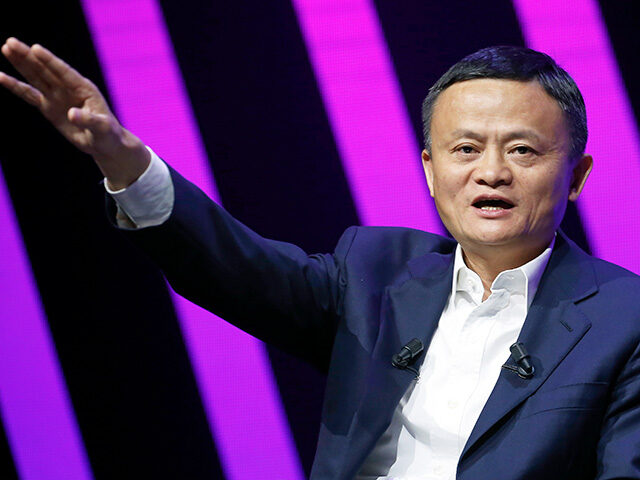China Parades Exiled Jack Ma in Bid to Save Sinking Economy
 Chesnot/Getty Images
Chesnot/Getty Images
Alibaba founder Jack Ma, once the richest man in China before he was ruined and exiled for daring to criticize the Chinese Communist Party, paid a visit to his company’s main campus in Hangzhou on Friday.
Ma ostensibly wanted to show his support for the enterprise he launched but no longer leads, although the regime in Beijing has lately been using him as a mascot to lure spooked foreign investors back to China’s sinking economy.
The South China Morning Post (SCMP) found the symbolism of Ma’s visit to Hangzhou unmistakable, especially since China is bracing for a new trade war against President-elect Donald Trump:
Ma’s visit was his first known trip back to to his hometown since March 2023, when the billionaire visited a school that he established. While Ma resigned as Alibaba’s executive chairman in 2019 and has kept a low profile since 2020, he remains widely seen as the spiritual leader of the company and the face of Chinese entrepreneurship.
His low-key visit to Alibaba’s campus comes at a time when the Chinese government is trying to boost confidence in the country’s private sector, as the world’s second-largest economy grapples with a slew of challenges, ranging from a persistent property market downturn to renewed geopolitical headwinds after U.S. president-elect Donald Trump threatened to levy additional tariffs on Chinese imports.
The “face of Chinese entrepreneurship” disappeared abruptly in October 2020 after daring to criticize the Chinese Communist Party’s hidebound economic policies at a conference in Shanghai.
Ma was erased from government websites, replaced as the host of a popular TV game show, and investigated for antitrust violations. The public went from embracing him as “Daddy Ma,” the avatar of business success, to calling him an “evil capitalist” and “bloodsucking ghost.”
WATCH — “Here I Am!” — Trump Warns China over Taking Advantage of American Workers While He Was Gone:
Ma’s Ant Group financial company was socked with a billion dollars in fines, and much of his personal fortune evaporated. Alibaba was broken up into six independently-run entities by regulators – a blow to Ma’s legacy, but also widely interpreted as a sign that the Communist Party’s war against uppity tech moguls was coming to an end.
Ma reappeared in late 2022 living as an exile in Japan, completely disengaged from the Chinese corporate and financial scene. He finally returned to China in March 2023, right after the Communist government terrorized both domestic executives and foreign investors with a string of pandemic lockdowns and tech industry crackdowns.
Rumor had it that Ma’s return was engineered by Premier Li Qiang, who was tasked by dictator Xi Jinping with restoring confidence to investors and entrepreneurs. Li reportedly got in touch with Ma’s friends in Japan to convince him to pay a reassuring visit to his hometown of Hangzhou, where he worked as a school teacher before launching Alibaba.
Ma was once a flamboyant media presence, but since his defenestration and exile he has made few public appearances. He visited a school when Li convinced him to return home in March 2023 and he ostensibly visited the Alibaba campus on Friday to boost sagging morale.
In a letter posted to the Alibaba internal website in September, Ma celebrated the 25th anniversary of the company’s founding, and advised its employees to stay strong as they face “fierce competition in various industries.”
“This is expected, as no company can always stay on top in any field forever,” he wrote.
Alibaba fared better than many other Chinese companies over the past year. The company posted second-quarter growth of five percent or $33.70 billion, beating analyst estimates of $33.47 billion. Most of the units broken away from the main company last year also grew.
As for the broader Chinese economy, University of Oxford research associate George Magnus told Deutsche Welle on Friday that the leadership in Beijing has “finally recognized that the economy seems to be losing momentum and is not a one-off.”
Despite this growing acceptance, Magnus faulted China’s leaders for crafting policies that were only “skirting round the edges” of the problem, such as the disappointing economic package rolled out in early November that did little more than restructure the debts of insolvent municipal governments, rather than stimulating demand.
“I’m not saying that Beijing will be hollow when it comes to further stimulus measures, but I think the government’s priority is certainly not to change the development model to become a more consumer-led, welfare-oriented economy,” he said.
Source link

